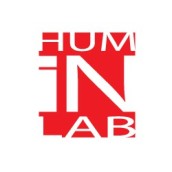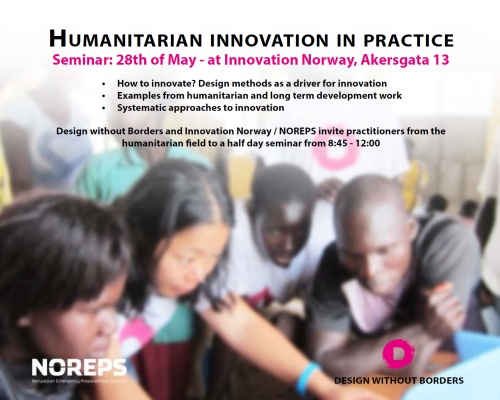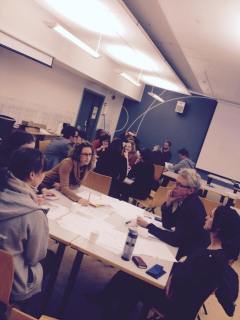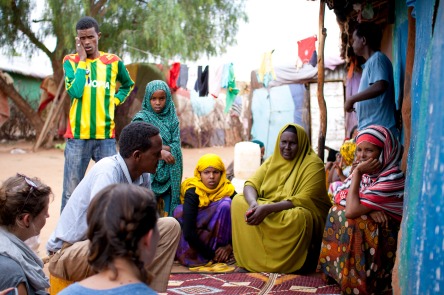Humanitarian markets: challenges and opportunities for innovation
Date/Time: 2nd December 2015
Location: PRIO
In the third seminar of the Humanitarian Innovation Lab dialogue series, Norwegian and International stakeholders are invited to discuss ‘the humanitarian market’. It has been acknowledged that the humanitarian relief system needs a paradigm shift, in which private enterprises are invited to the table of collaborations. In our discussion, we will focus on the structures of the humanitarian market as per today and new approaches that are taken to foster innovation in private-humanitarian partnerships. This debate on humanitarian market structures includes whether or not it should remove itself from the status as a quasi-market. Should emergency relief contexts be regarded as direct market opportunities, or are there other and more responsible approaches that can foster humanitarian innovation?
09:00 Welcome and introductions
Kristin B Sandvik: Challenges of the humanitarian market
09:30 Panel discussion between NRC, NCA, MSF, ICRC and NOREPS representatives:
What are the challenges facing humanitarian markets today? A practitioner’s perspective
- The relationship between private and humanitarian sector
- Selection processes and follow up – drivers, barriers and accountability
- Humanitarian market: quasi-or direct market opportunities?
- The roles of local partners and systemic approaches
- Creating longer term opportunities for innovation and impact in humanitarian markets: is it possible (and meaningful)?
11.30 Lunch
12.15 Academic perspectives on the private/humanitarian relationship:
Brita Fladvad Nielsen: ‘Mapping of multiple agendas to understand and increase the impact of product, service and system innovation in humanitarian action’
Linnet Taylor: ‘Innovation, disruption and competition in the humanitarian sphere’
Marianne Jahre: Title to be determined
13:45 Coffee break
14:00 Panel discussion:
The humanitarian sector and private sector actors: a problem of values or objectives?
The discussions will continue with an informal dinner for those who wish (TBD).
The seminar is in English.
Contact info: brita.nielsen@ntnu.no Tel: +954 24 055
Humanitarian Innovation in practice seminar
The seminar “Humanitarian Innovation in practice” is hosted by NOREPS, Innovation Norway and Design without Borders.
The seminar will provide a meeting point where best practices and experiences can be shared, and common challenges discussed.
The seminar will take place Thursday the 28th of May at Innovation Norway in Akersgata 13, Oslo, from 8:45 to 12:00.
For more information about the seminar, please contact Synne Christiansen, Project Manager at Design without Borders.
CONCLUSIONS FROM THE HUMANITARIAN DESIGN AND INNOVATION SEMINAR
The Humanitarian Innovation and Design seminar took place at the department of product design at NTNU the 11th of March.
A major part of the seminar was allocated to brief presentations, with following questions and discussions. A final group work session elaborated upon the questions that had emerged during the day. A significant part of the discussions was related to education and research at NTNU within the topic of humanitarian innovation, including:
- HUMANITARIAN PROJECT INVENTORY: Within NTNU as well as nationally there is no inventory of researchers or projects relating to humanitarian innovation. Connecting people working with similar issues would be an asset for a HI Lab.
- CONTEXTUALIZATION COURSES: The topic of contextualization had been brought up by one presentation about an energy project in Ethiopia and a resulting discussion was concerned with how the different departments can better collaborate regarding field research and preparations for field work.
- INTRO COURSES: Crash course as an introduction to humanitarian landscape at NTNU
- CO DESIGN: the HI Lab should link people with NGOs, companies and locals
- MAKE MORE NOISE: There is currently no arena for designers of technologies to ‘test’ out their innovations in terms of an expert panel, or similar.
- ETHICS: in social sciences Ethics is an integrated part of coursework; in technology educations less so.
- PARTNERSHIPS: how should practitioners and researchers work together?
- IDENTIFYING ‘REAL PROBLEMS’: the HI Lab must have a determined approach to make sure it is real problems of humanitarian action that are ‘treated’ instead of symptoms.
The course included a broad spectrum of NTNU departments; from the Department of Product design, the Department of Geography/Development studies, the Department of Urban Design and Planning, the Department of Computer and Information Science and the Department of Energy and Process Engineering. In addition there was one enterprise operating in the humanitarian market (Morpho Solar), as well as Engineers without Borders.
Humanitarian Innovation and Design Seminar
| Date and time: | 10 March 2015, 09:00-16:00 |
| Place: | Department of Product Design, NTNUKolbjørn Hejes Vei 2 B, 7491 TrondheimRoom 247, Second floor |
The number of disasters worldwide is expected to multiply in coming years. For humanitarian actors working to meet the needs of disaster struck communities, this development increases the pressure to adapt proportionally. Humanitarian innovation, better collaboration with private enterprises in the emergency context, and information-sharing between grassroots and decision makers are considered as requirements for addressing these challenges. Fulfilling such requirements may lead to a so-called paradigm shift in the way humanitarian action is executed. This further includes challenges and opportunities for product, service and systems design, and demands cross-disciplinary approaches.
As part of this debate – consisting of multiple interests and colliding agendas –we initiate a critical discussion on these issues in order to map out how NTNU, the Norwegian Center for Humanitarian Studies (NCHS) and PRIO can play a key role in creating arenas for purposeful and applicable research. The seminar brings together different disciplines and projects at NTNU.
This is the second seminar where the Department of Product Design at NTNU, NCHS and PRIO invite researchers invested in this thematic to present and discuss common grounds for the future of humanitarian innovation within Norwegian academia. At the previous seminar, participants included NTNU, PRIO, NRC, Innovation Norway, NFR and the Ministry of Foreign Affairs.
| PROGRAM | |
| 09:00 – 09:30 | Coffee |
| 09:30 – 09:45 | Introduction round and welcome |
| 09:45 -10:05 | Brita Nielsen: a brief summary of considerations from my Ph.D. research for the Humanitarian Innovation lab collaboration |
| 10:05 -10:20 | Kristin B. Sandvik og Maria Gabrielsen: Unpacking Humanitarian Innovation: Understanding the relationship between Humanitarian Accountability and CSR and the Consequences for Principled Humanitarian Action |
| 10:20-10:30 | Questions and discussion |
| 10:30-10:40 | Coffee break |
| 10:40-11:00 | Ida Nilstad Pettersen: Design and transitions in practice |
| 11:00-11:20 | Kathinka Hasselknippe, Gudrun Reikvam and Julie Grande: Design of energy alternatives for Kebri Beyah Refugee Camp, Ethiopia |
| 11:20:11:30 | Q&A |
| 11:30-11:50 | David Sanderson: Experiences of the Humanitarian Innovation Fund |
| 12:00 – 12:40 | Lunch |
| 12:40 -13:00 | Pamela Sitko : Urban Disaster Resilience |
| 13:00 – 13:20 | Ole Jørgen Nydal: African university collaboration on solar energy |
| 13:20 -13: 40 | Morpho Solar: entrepreneurial experiences with solar cooking |
| 13:40 – 14:00 | Engineers without borders: Encouraging engineering students to work with humanitarian aid |
| 14:05 – 16:00 | Further discussion in groups about:- common interests and collaboration possibilities for research
– research and education objectives |
The seminar will be held in English.
For further information and registration to the seminar, please contact:
Brita Nielsen, brita.nielsen@ntnu.no, telephone: +47 954 24 055.
Launching a platform for Humanitarian Innovation in Norway
The need to create an agenda for how Humanitarian Innovation shall transform the overwhelmed humanitarian relief system is urgent. Humanitarian Innovation as a theme has therefore started to emerge from all corners of the world; humanitarian actors, private partners, NGOs and academia.
A dialogue was initiated between the Department of Product Design at NTNU and the Norwegian Centre for Humanitarian Studies at the Peace Research Institute Oslo (PRIO) in fall 2014. This resulted in the first Norway based, cross-disciplinary platform seeking to evolve the area of Humanitarian Innovation. This blog will present ongoing activities, collaborations and discourses. The project has been named Humanitairan Innovation Lab and will aim at academic advancement as well as applied research projects, in collaboration with humanitarian partners.







